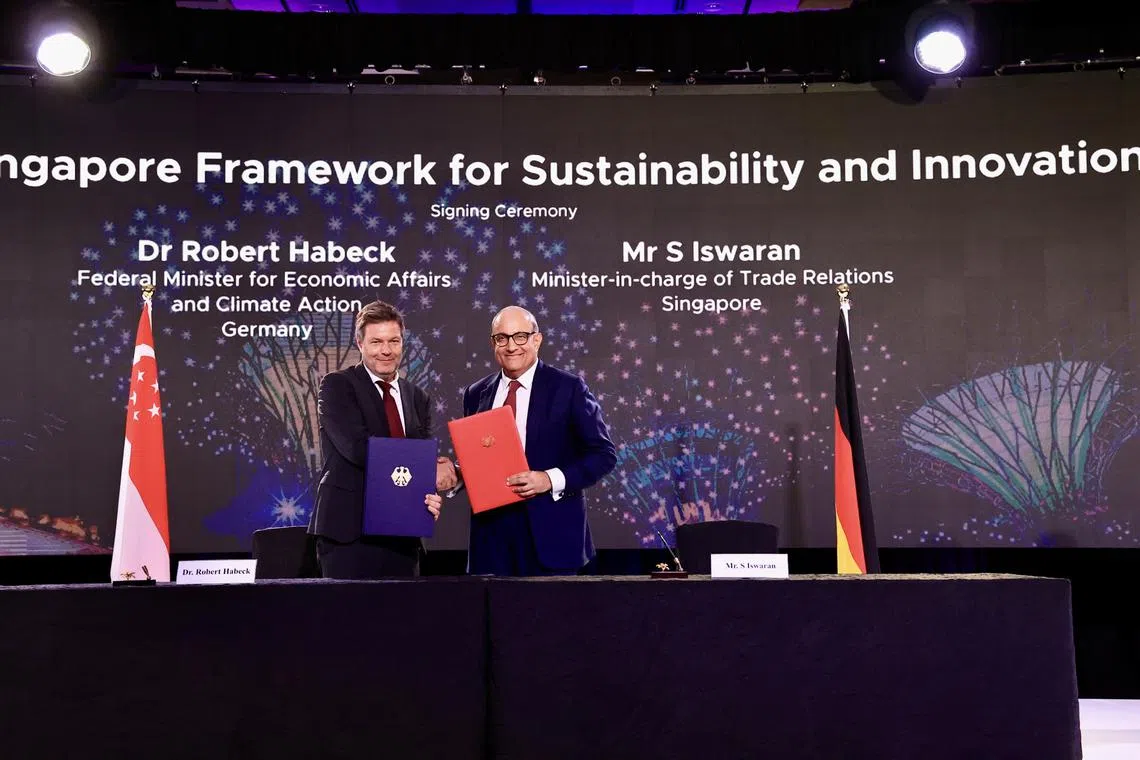More opportunities in sustainability, innovation for S’pore companies capturing German market
Sign up now: Get ST's newsletters delivered to your inbox

The framework will give structure to and deepen economic collaborations between the two countries’ governments and businesses.
PHOTO: LIANHE ZAOBAO
Follow topic:
SINGAPORE – Home-grown manufacturer Armstrong Industrial Corporation helps German giants such as Mercedes-Benz and BMW cater to customers in Asia through its 16 factories in the region that manufacture car parts and other items, including eight in China alone.
Group chief executive Phyllis Ong told The Straits Times that the company, which employs around 3,000 staff across Asia, wants to capture the growing market of European companies that are seeking local partners to reduce their operational risks in the region.
Armstrong is among the local companies that could benefit from a new Germany-Singapore Framework for Sustainability and Innovation that was signed on Sunday by Singapore’s Minister-in-charge of Trade Relations S. Iswaran and Dr Robert Habeck, Germany’s Federal Minister for Economic Affairs and Climate Action.
The framework will give structure to and deepen economic collaborations between the two countries’ governments and businesses, and promote private sector-led collaborations across sectors such as advanced manufacturing, mobility and green technologies.
It will also facilitate cooperation in areas such as business matching, networking and workplace training, said the Ministry of Trade and Industry.
Armstrong hopes the framework will help it create the sustainable innovation that is a key part of its ambitions as its customers increasingly want green materials in manufacturing processes. For example, the company already uses lightweight foam to make parts that help cars consume less fuel, said Ms Ong.
But green materials make up a very small fraction of its manufacturing, and the company is exploring sustainable alternatives such as expanded polypropylene, a recyclable foam, she added.
“To become 100 per cent green is not viable, but we can take steps to be a more energy efficient and responsible organisation,” she said.
At the signing of the framework on the sidelines of the biennial Asia-Pacific Conference of German Business, Mr Iswaran said like-minded partners must continue to signal their commitment to greater economic integration amid various headwinds in the global economy.
“When you look at South-east Asia and the growth that we anticipate, we will need solutions that will reduce energy intensity and carbon intensity. That means working with partners like Germany, for example, in the hydrogen economy, something Germany’s already pursuing,” he told reporters.
Mr Iswaran added that the flagship German business conference for the Asia-Pacific, held in person for the first time in four years, has generated renewed impetus for collaborations.
For example, Enterprise Singapore (EnterpriseSG) and NRW.Global Business, the trade and investment agency of German state North Rhine-Westphalia, will develop a joint work plan for business cooperation in sectors such as renewable energy and information and communications technology.
“We welcome Germany’s strong interest to expand trade and investment with Singapore as the gateway to the region,” said Mr Iswaran, who is also Transport Minister.
The 17th Asia-Pacific Conference of German Business was co-organised by the Asia-Pacific Committee of German Business, the German Ministry for Economic Affairs and Climate Action and the Singaporean-German Chamber of Industry and Commerce, with the support of various Singapore government agencies.
More than 600 participants attended this year’s conference.
Singapore companies had invested more than $4.5 billion in Germany as at 2020, and there are currently more than 70 with a physical presence there.
Mr Philip Ong, chief executive officer of SP Manufacturing, which acquired a factory in Monchengladbach, Germany, in 2019 with EnterpriseSG’s help, said his company is looking to invest further in the country.
SP Manufacturing produces printed circuit boards for machinery in industries ranging from railroad infrastructure to industrial chilling systems.
It is looking to acquire German businesses that, for example, design equipment for other companies, said Mr Ong.
Dr Habeck said German companies are diversifying their businesses, and many have headquarters in Singapore, which they see as a gateway to Asia.
“Investments from Singapore are highly appreciated in German companies,” he said, adding that businesses from both sides recently inked partnerships in areas such as healthcare technology and the circular economy.
Deputy Prime Minister and Finance Minister Lawrence Wong said in a fireside chat at Sunday’s event that Germany and Singapore can help to build closer ties between their respective regions amid global geopolitical tensions, including US-China rivalry.
He added: “The rest of us in the world are not just passive bystanders. We ourselves have agency and the ability, too, to shape developments regionally and internationally.”
Mr Clarence Hoe, EnterpriseSG’s executive director for the Americas and Europe, said Germany is a major economy in Europe with a big consumer market and advanced manufacturing capabilities.
“This continues to present opportunities for Singapore companies in areas such as retail and packaged foods as well as collaborations in tech sourcing and co-innovation,” he said, adding that Singapore companies that are keen to connect to German partners can tap initiatives like the Global Innovation Alliance.


